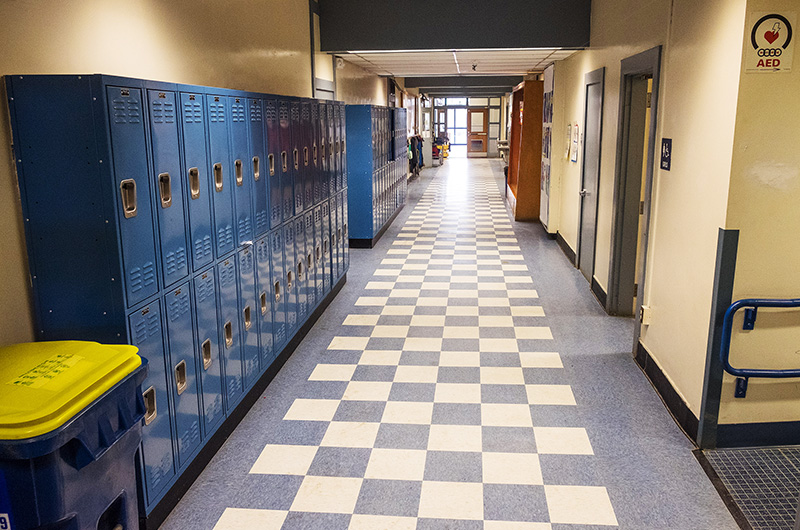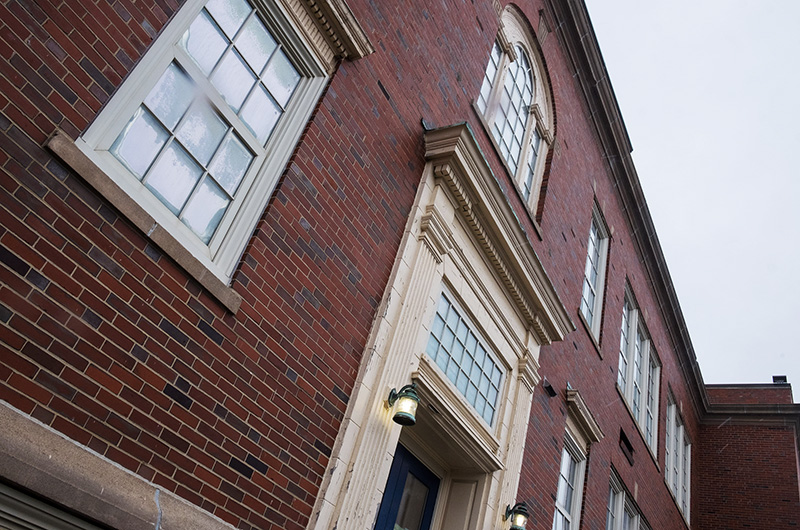The $46.6 million proposal to build a new school is by far the most anticipated item at the Tisbury annual town meeting next week. Voters will also consider the future of the Tisbury town hall and even new rules for how articles are presented on the town meeting floor.
Special and annual town meetings begin at 7 p.m. Tuesday in the Tisbury School gymnasium. Town moderator Deborah Medders will preside. There are 20 articles on the special town meeting warrant and 40 articles on the annual warrant. The annual town election will be held two weeks later, on April 24.
Voters will be asked to approve a $27.9 million fiscal year 2019 operating budget.
The Tisbury School was invited into the competitive Massachusetts School Building Authority (MSBA) process in early 2016. The state agency provides guidance and funding to schools in need of renovation or new construction, and has offered to cover about $14.6 million of the cost of the new school project. While voters will have to approve $46.6 million for the project, the town will actually be responsible for about $32 million thanks to MSBA contributions.
School principal John Custer points to lack of space for special education programs and programs for English learners as primary needs at the school. Currently, the school uses an external modular unit for some programs. Inside the school, special education needs for all grades (K through 8) are restricted to two resource rooms.
The school building committee, led by Colleen McAndrews, has explored various options for updating the school as is required in the MSBA process. Possible alternatives have included renovating the existing building and building a new school on a different site.
Under the guidance of project manager Daedelus Projects and architect Peter Turowski, the school committee has developed a preliminary design for a new 76,000 square foot school to be built on the same site as the existing school. Classes would continue in the existing school throughout an estimated 20 months of construction. After the new school’s completion, planned for August of 2021, the existing school, originally built in 1929, would be demolished.
If the project is approved, taxes are expected to increase a maximum of $108.20 per $100,000 of property value. The school project would continue to affect taxes for 20 years at a gradually decreasing rate.
Critics of the measure cite the historical significance of the existing building and the unprecedented cost of the project as sticking points. Proponents see the project as a long-overdue investment in the future of the town.
The project will require a two-thirds majority vote at town meeting and a simple majority at the ballot. Discussion is expected to be lengthy, and the town is preparing for overflow attendance by equipping extra space with audio and visual connection in case the school gymnasium fills to capacity.
“Because of the interest in the school facility building article, we certainly are anticipating a larger than normal attendance, and with that anticipating more persons taking the microphones to pose questions or offer up opinions,” Ms. Medders said. She added that she does not plan to rush discussion of the school article, anticipating questions and arguments on both sides of the issue.
“At some point I will begin to get a sense of where the town floor is with listening, and that is when I will begin to think, do I want to offer up the directive that we wind down comment,” Ms. Medders said. Approval of the school project also hinges on a corresponding Proposition 2 1/2 override question on the April 24 ballot.
And while the school is by far the largest, it isn’t the only building project that will be considered next week. Voters will be asked to take steps toward building a new town hall as well. One article will ask for $675,000 to acquire property at 55 West William street for a new town hall. Another article asks for $50,000 from the unreserved fund to finance planning for the new facility.
Meanwhile, the existing town hall needs repairs. Voters will be asked to spend $200,000 from the unreserved fund another $200,000 of CPA money to replace or repair the steeple on existing town hall. Inspections of the structure have shown that it is listing toward the building and that wooden beams have insect rot and water damage.

Since 1991, Tisbury has used a lottery system at town meeting, taking up warrant articles in random order rather than sequentially as they are presented on the town warrant. Ms. Medders said that practice began before her tenure as town moderator and was meant to help maintain a quorum at town meeting.
“My understanding was there was a growing concern that people were coming for specific articles and bringing a block of votes,” she said. “This was becoming rather chronic. The town would lose quorum once that [specific article] occurred.”
An article on the Tisbury warrant this year by petition would amend the practice to consider warrant articles in the order they appear on the warrant.
The special town meeting warrant includes a proposal submitted by the board of health to add a bylaw to regulate housing rentals in Tisbury. The new bylaw would increase town oversight by requiring landlords to obtain a certificate from the town before renting out a living space.
But with the passage of legislation regulating short term rentals in the state senate this week, the board of health has decided to postpone the article on the town meeting floor.
“It doesn’t make sense to move forward with regulations that would have to be changed almost immediately anyway,” said Tisbury health agent Maura Valley. The state bill will now enter the process of reconciliation between the house and senate.
In addition to the override vote on the school project, there is one contested race on the ballot for the April 24 election. Four people are running for three three-year seats on the finance committee. Polls will be open from noon to 8 p.m. at the emergency services building on Spring street.









Comments (18)
Comments
Comment policy »